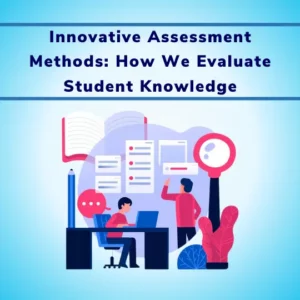Article Contents
Introduction
Welcome to the future of education! As we step into 2024, educational technology (EdTech) is not just evolving; it’s revolutionizing the way we learn.
EdTech is rapidly transforming traditional educational landscapes across the globe. In this blog, we’re diving into the top 10 EdTech trends that are not just reshaping but reimagining the learning experience.
From the rise of Generative AI in assessments to the adoption of AI in question bank management, the future is full of innovation.
The global EdTech market, which reached $133 billion in 2023, is expected to grow upwards to $433 billion by 2030.
Financial Express
Personalized AI tutors are becoming the new norm, making self-study more effective than ever. The blend of online and offline learning in hybrid models is now the preferred choice, catering to diverse learning needs.
This is an era of rapidly evolving AI technology. Technology has become an inevitable part of our lives. Technologies like AI-ML, hybrid learning, technology for assessment, and auto-subjective evaluations are reshaping the education sector.
81% of US educators believe and say that EdTech has improved their ability to handle technology and make learning faster and easier.
Highlights on how the Education Sector will see technology-driven growth in 2024
Education is getting disrupted
The year 2023 was filled with many ups and downs. It also witnessed a lot of changes related to the acceptance and adoption of technology in many different sectors, especially in the education sector.
There is a high chance of these changes getting accelerated across schools, colleges, universities, etc. in the year 2024.
The year 2024 will help expedite the adoption of online modes for the delivery of education. There will also be some drastic changes in the degrees being offered by various universities. This will result in altering traditional ways of education and accepting online education with optimism. Thus, in this article, we are going to see how EdTech is likely to change the educational scenario in 2024.
Upcoming Trends in Education Technology
1. Generative AI Adoption for Assessment
Once upon a time, in the traditional world of education, assessments were similar to memory challenges. Students were often measured by how well they could recall information, turning exams into simple tests of memorization. This method, although common for years, overlooked a crucial aspect of learning – the development and evaluation of real-world skills.
As we step into 2024, a new protagonist emerges on the educational stage – Generative AI. This innovative technology is set to revolutionize the way students are assessed, shifting the focus from rote memorization to skill-based evaluation.
99.4% of 509 higher education institutions in the US say that AI in education and learning will be instrumental to their future.
Axon Park
Imagine a classroom where assessments are not just about writing answers on paper but interacting with an intelligent AI bot that understands and evaluates your knowledge and skills in real-time. This is the transformative power of Generative AI Assessments.
These AI bots, designed to interact seamlessly with students, delve deep into their problem-solving abilities, depth of knowledge, and domain-specific skills. The conversations with these bots aren’t just questions and answers; they’re dynamic discussions that adapt and evolve based on the student’s responses, ensuring a comprehensive evaluation of their abilities.
One of the most compelling advantages of generative AI assessments is their unbiased nature. Unlike human evaluators, who may unintentionally let biases influence their judgment, AI operates on algorithms that ensure fairness and consistency.
This means every student gets an equal opportunity to showcase their skills and knowledge, leveling the playing field in education.
As we look ahead, it’s clear that Generative AI-based assessments will become a cornerstone in the educational landscape. Numerous institutions are poised to adopt this innovative approach, recognizing its potential to enhance learning outcomes and better prepare students for the challenges of the real world.
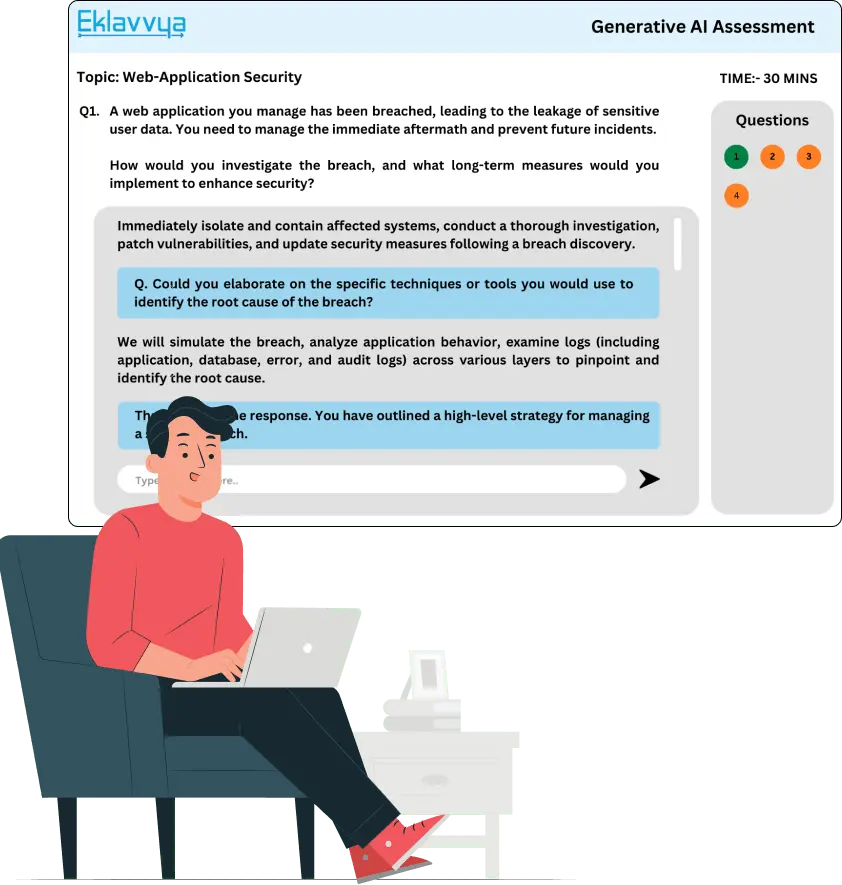
The future of exams is bright and interactive. Generative AI enables the creation of descriptive exams that are not only automatically evaluated but also engaging.
Students will find themselves in a stimulating environment where they interact with a live bot, responding to questions that appear on the screen. The AI’s ability to analyze responses and pose subsequent questions makes the exam experience more like an intellectual conversation than a test.
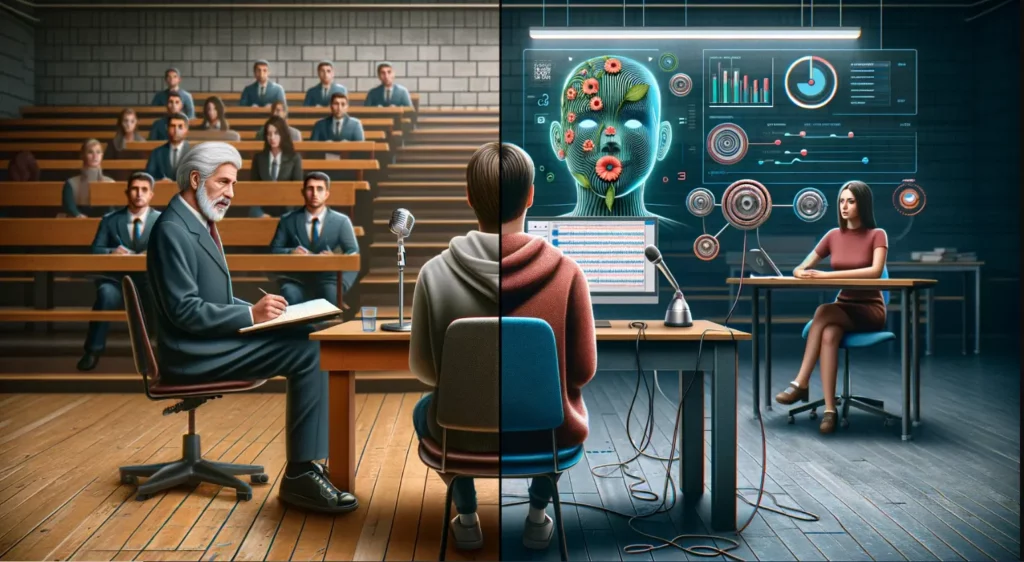
Generative AI is poised to revolutionize Viva or Oral exams as well. Typically, an examiner must be present for these assessments, evaluating a candidate’s ability by asking questions. In this scenario, Generative AI can efficiently and accurately interact with the student, recording their responses as audio files within the system.
By analyzing the context of the student’s answers, Generative AI can assign a unique rating and provide personalized feedback. Thus, the evaluation of Oral or Viva assessments becomes significantly more manageable with the aid of Generative AI-based techniques.
2. Eklavvya AI
Eklavvya.ai offers invaluable support for exam preparation.
Designed with a focus on aiding users to gear up for various competitive examinations, this online resource facilitates the practice of mock tests for various competitive exams.
Through eklavvya.ai, students have the opportunity to engage in comprehensive practice sessions that mirror the rigour and structure of actual competitive exams.
Leveraging AI technology, eklavvya.ai customizes questions to align with specific exam syllabi, offering a simulation of real exam conditions. This feature enables learners to engage in targeted practice with mock tests that are indicative of the actual exam format.
Furthermore, eklavvya.ai provides a detailed analysis of users’ performance, broken down by topics and chapters. This analytical approach not only deepens understanding of the subject matter but also highlights areas for improvement.
Eklavvya.ai’s platform is adept at tracking and comparing performances across various assessments, allowing users to monitor their advancement in specific subjects, topics, and subtopics. It also offers insights into time management and question accuracy, critical components of exam success.
Featuring modes such as test, live mock test, and practice, eklavvya.ai tailors the learning experience to fit the needs of its users. Especially noteworthy is the practice mode, which supplies thorough explanations for each question, thus significantly streamlining the study process. Overall, eklavvya.ai emerges as an essential tool for efficient and effective exam preparation, revolutionizing the way learners approach their studies.
3. Revolutionizing Question Bank Management with AI
Imagine being a subject matter expert at a bustling educational institution. Your days are consumed by the daunting task of assembling a question bank tailored to the exam syllabus of each specific subject.
Picture yourself sifting through mountains of textbooks, racking your brain to ensure each question aligns perfectly with the topic, difficulty level, and educational goals.
This is the reality for many educators, a laborious and time-intensive endeavor. But what if this entire process could be revolutionized?
2024 marks a pivotal year in educational technology, with Generative AI emerging as a groundbreaking tool in question bank management. Let’s dive into a scenario where this technology takes center stage.
You’re now equipped with a state-of-the-art Generative AI system. You feed it the exam syllabus – a document detailing subjects, topics, and the desired difficulty levels of questions. With the click of a button, the AI starts whirring into action.
The AI meticulously analyzes the entire syllabus, understanding nuances and intricacies of each topic. In mere moments, it generates a unique set of questions, each tailored to match your specific requirements. Gone are the days of poring over textbooks for hours. Now, you can conduct exams with a question bank crafted effortlessly by AI.
The power of Generative AI doesn’t stop there. It offers a bespoke experience. Need questions for a specific chapter or topic? Provide the AI with a PDF or Word file of the content, and watch as it churns out questions that are not just relevant but also engaging and diverse.
You can also upload exam syllabus to the tool to generate a unique set of question banks as per your requirement. It can accelerate your question bank creation process.
Whether you’re looking for descriptive answers or multiple-choice queries, the AI tailors its output to fit your needs, considering the difficulty level and the target student audience.
In 2024, the landscape of question bank management and exam creation in the education sector is undergoing a transformative shift. Generative AI is at the forefront, driving efficiency, precision, and innovation.
This isn’t just a trend; it’s a paradigm shift, a leap towards an era where educators can focus more on teaching and less on the arduous task of question creation.
4. Personalized AI Tutor for Self Study

In 2024, a new chapter unfolds in the world of education technology, marked by the rise of personal AI tutors. Imagine a world where a student, let’s call her Emma, sits down with her tablet and opens an app. This isn’t just any app; it’s her personal AI tutor, designed to understand and adapt to her unique learning style.
Emma uploads her biology notes into the app. Within seconds, the AI, which she’s named “Alex,” analyzes the material and begins to engage her in a thought-provoking discussion. Alex doesn’t just regurgitate information; it asks Emma questions, challenging her to think critically about the topic. When she struggles with a concept, Alex breaks it down, using examples and even humor to make learning fun and effective.
But Alex isn’t just for answering questions. It’s a proactive learning partner. As Emma prepares for her upcoming exam, Alex reviews her past quizzes and identifies areas where she needs improvement. It then tailors the study sessions to focus on these topics, ensuring Emma is well-prepared.
The beauty of this AI tutor is its accessibility. Whether Emma is studying late at night or has a quick question before class, Alex is always there, ready to help. It’s like having a personal tutor available 24/7, but without the cost or need to schedule appointments.
For educators, this technology opens new doors too. They can recommend AI tutors like Alex to students who need extra help or want to accelerate their learning. It’s a tool that complements classroom teaching, offering personalized support that was once unimaginable.
In essence, the AI tutor represents a major shift in how we approach education. It’s not just a tool for learning; it’s a partner in the educational journey, making learning more engaging, personalized, and accessible for everyone. Whether you’re a student like Emma, looking to deepen your understanding of a subject, or an educator seeking to enhance your students’ learning experience, the AI tutor is a game-changer in the world of education.
5. Hybrid learning will be a preferred way of learning
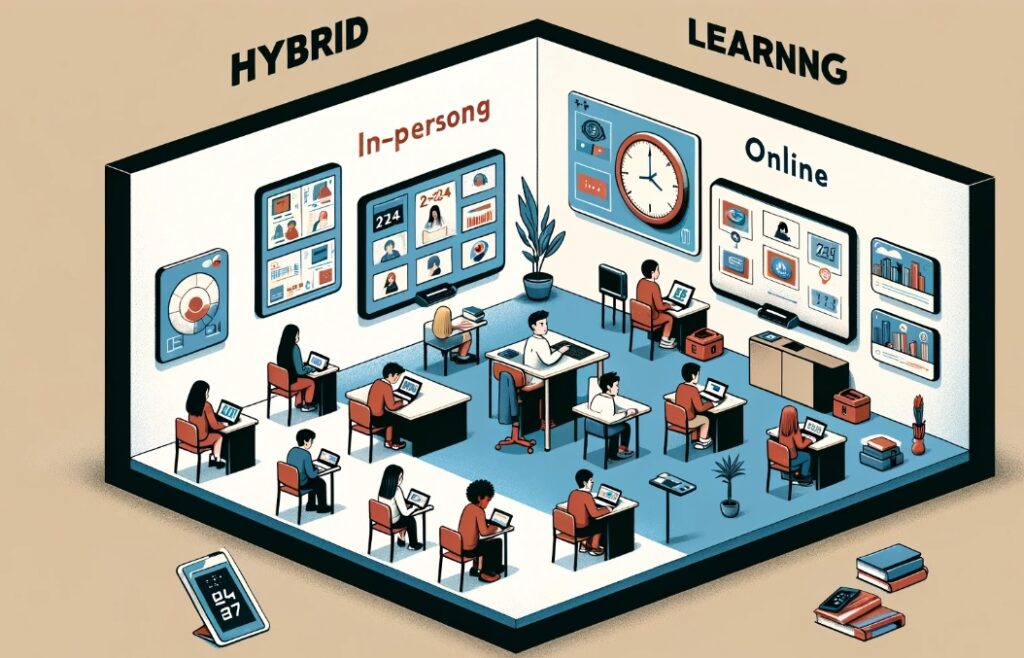
Imagine a world where the boundaries between physical and virtual classrooms blur, creating an exciting, dynamic learning environment. This is the reality of hybrid learning, an innovative approach that’s reshaping education in 2024.
Meet Emily, a college student. She’s always been passionate about Environmental Science but equally intrigued by Graphic Design. Thanks to hybrid learning, Emily no longer has to choose between her two interests. She attends her Environmental Science classes in person, soaking in the campus life and interacting face-to-face with her peers and professors. But at the same time, she’s enrolled in an online Graphic Design certification course, learning from renowned designers from around the globe.
Hybrid learning isn’t just a convenience for Emily; it’s a gateway to a richer, more diverse education. She enjoys the traditional college experience while gaining specialized skills online. This dual approach helps her stay ahead in the competitive job market.
2024 has seen a surge in short-term online courses. These courses are laser-focused on employability and practical skills. Students like Emily are jumping at the chance to add these certifications to their resumes. They’re not just learning; they’re becoming more marketable.
As an educational institution in this era of hybrid learning, it’s crucial to be technologically adept. Offering an engaging, seamless blend of in-person and online education is no longer a luxury; it’s a necessity. Institutions must provide platforms and resources that support this blended learning model, ensuring that students receive the best of both worlds.
6. Tech companies to Enter the Education sector
In the year 2024, the possibilities of companies working in the field of technology to enter the education sector, have tie-ups with reputed educational institutions or even establish their universities.
A reputable multinational company might come up with its curriculum which will be completely focused on providing practical knowledge. These courses would provide knowledge customized as per the industry requirements and provide emphasis on the employability aspect.
There would be more tie up, partnerships or associations with private and government universities with technology companies to remain ahead of this transformation.
Education Institutions would prefer to provide more weightage to the technology-driven growth in a number of students enrolling for the course and come up with a unique curriculum to suit remote learning as well as a hybrid mode of learning.
AI is poised to revolutionize the education sector, necessitating the recruitment of specialized AI officers for educational institutions. These institutions will require experts well-versed in AI applications and their integration into existing educational workflows. These professionals should also be familiar with best practices for AI implementation and the security measures needed during this process.
As it stands, expertise in AI remains scarce within the education domain. Consequently, the sector will likely seek to fill positions such as AI officers, consultants, and coordinators to ensure successful implementation of AI-related applications.
7. Remote Proctored Exams
The exams which will be conducted online will be monitored using remote proctoring techniques. Various algorithms which will be developed using advanced technology such as Artificial Intelligence will help educational institutes to conduct online exams in an environment that is free of cheating.
Thus, the location constraint will be eliminated and the students can appear for the exam from any remote location in a secure environment.
Eklavvya is being used in more than 15 countries in the world to conduct remotely proctored online exams. Right from schools to universities, all the educational institutions are choosing Eklavvya’s platform.
Such platforms will be aggressively adopted by educational institutions in the current year. Thus, remote proctoring has helped to digitize the old traditional way of conducting exams.
8. AI adoption across the Education will Increase
The growth of AI has become a massive topic of discussion so far and so has the potential for all the things it can do. In that case, AI would be one of the best ways to implement technology in the education process. AI can take over the positions of proctors in online exams and keep an oversight of the students online.
Considering how AI is built, it will be easier to check for any sort of rules being broken or any cheating can be caught quickly. It will also make its way into the classrooms to identify students through face recognition which will help teachers keep track of attendance of the class and make sure all students are in the class and attentive.
9. Niche learning with Videos on the internet:
Video learning is already proving to be the smartest way to incorporate technology into classes. Video classes or videos shown about the lessons can be very efficient and help students to learn visually while watching related videos and discussing them with each other to get a full understanding of the subject.
Video Learning might become even bigger with hands-on the VR world in classes. Visual classes which help students to imagine, understand and interact with have proven to be very efficient as a learning tool.
10. Chatbots will turn daily part of students’ lives
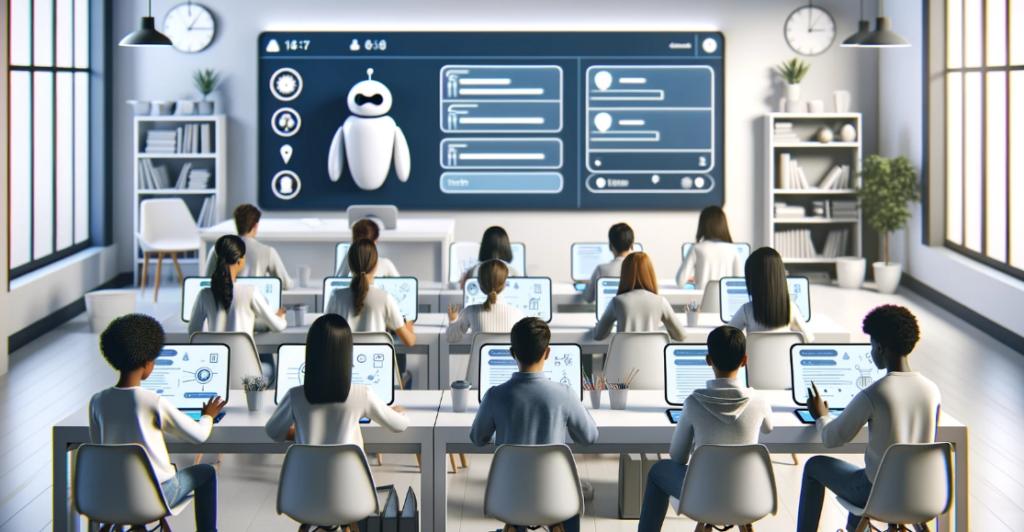
Imagine a classroom where every student has their own personal tutor, available 24/7, always ready to help, and tailored to their unique learning style. This isn’t a scene from a sci-fi movie; it’s the reality of education in 2024, thanks to the rise of chatbots in the education sector.
The Personal Tutor in Your Pocket
In 2024, chatbots have become an integral part of learning. These AI-driven assistants are like having a tutor in your pocket. They’re smart, always up-to-date, and, most importantly, they understand you. Whether it’s tackling a tricky math problem or exploring the depths of Shakespearean plays, these bots are equipped to provide step-by-step guidance, making learning not just effective but truly engaging.
Interactive Learning: Making Education Fun
Gone are the days of monotonous lectures and one-size-fits-all teaching methods. Chatbots have transformed learning into an interactive adventure. They use quizzes, interactive games, and even virtual reality experiences to make learning fun and memorable. Imagine learning about the solar system not by reading a textbook, but by taking a virtual tour of the planets, guided by your personal chatbot.
Engaging Learning: Keeping Students Hooked
Engagement is key in education, and chatbots are masters at keeping students hooked. They are programmed to recognize when a student is losing interest and can switch tactics, introduce new learning formats, or even suggest a well-timed break. This ensures that learning is not just effective but also enjoyable.
Personalized Learning: Every Student is Unique
Each student has their own way of learning, and chatbots in 2024 are adept at adapting to these individual needs. They analyze learning patterns, understand strengths and weaknesses, and customize their teaching approach accordingly. This means no student is left behind, and everyone gets the attention they deserve.
Chatbots in Educational Institutes: Beyond Teaching
It’s not just about personal tutoring; educational institutes are also leveraging chatbots to streamline their operations. From answering FAQs about courses and admissions to helping students navigate campus life, these chatbots are like virtual helpdesks, making administrative tasks more efficient and user-friendly.
Advantages of Education Technology
1. Cost-effective
Online learning is also going to prove cost-effective as the costs invested in infrastructure will be eliminated. For example, a candidate enrols on a full-time offline MBA course for which he/she needs to pay 50,000 USD. The cost of the same course can be reduced to as low as 10,000 USD or 15000 USD if it is taken online mode.
The guest lecturers need not travel to the college or university to share their knowledge with curious young minds which also helps to save some bucks. The technology is thus going to save you from burning a hole in your pockets.
2. Flexible Education
Due to hybrid education, a smaller number of students will be allowed to visit the campus to attend physical classes. Hence, the management will be able to accommodate a greater number of students in a class. All the barriers related to physical classes will be removed and education can thus become flexible with the help of technology.
3. Time flexibility
As the online exams are conducted remotely, students belonging to any geographical area or any time zone will be able to appear for the online exam. Thus, the location barriers are eliminated.
4. Voice-based assessments and programming tests
Voice-based assessments and programming tests are some examples of how education technology is proving advantageous to the education sector. Both of these assessments can be conducted online with the help of education technology.
Voice-based assessments come with an option to record the answers which are orally said by the candidates while in the case of the programming tests, options are provided to compile and run the code to check the output after the program code is written by the candidate.
The answers recorded while giving voice-based assessment are later listened to and evaluated by the examiners but in the case of programming tests, the evaluation is automated. The system itself checks the code and evaluates it. Voice-based assessments can be used to conduct oral or viva exams and programming tests can prove useful to conduct online exams to assess candidates’ knowledge related to any computer languages.
Conclusion
As our education only grows and progresses with more and more advances it, it is about time we start implementing even more technology into the classes and the concept of learning to make education even more efficient and convenient. The digitalization of the concept of education will not only bring more learners wanting to learn more things but also a sense of flexibility and efficiency in the education sector.
In 2024, education will be all about creative thinking, critical analysis, and innovative technologies rather than just the growth of student memorizing capacity. Technologies like Digital Answer Sheet Evaluation, Generative AI based Assessments, AI Viva Assessments, AI integrated online proctored exams will change the face of education; whether AI will prove to be a threat or a boon to the education sector is debatable, but one thing is certain, AI will be a game changer in this sector.
About the Author

Swapnil has experience of more than 15 years in the Information Technology sector. He has been working on digital platforms in the education sector. Swapnil is an avid reader and writes articles on technology and leading developments in the education and IT sectors.
Swapnil is the founder of Splashgain, an Education Technology company from India working on various innovative EdTech platforms for examinations, proctoring solutions, digital admission processes, and more. Splashgain has been working with many educational institutes and universities for AI-powered innovations and solutions to transform the education sector.
Splashgain has also filed a patent for an innovative product based on AI.


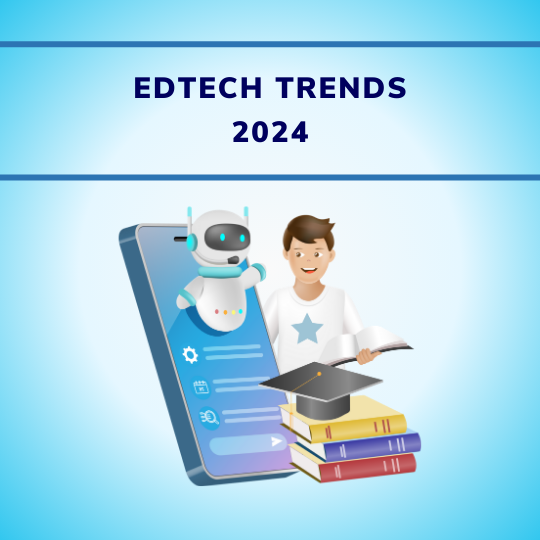
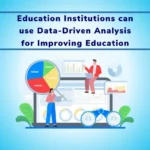
![How Government-Led Exams at 250+ Locations Are Setting New Standards of Integrity [Case Study]](https://www.eklavvya.com/blog/wp-content/uploads/2024/04/Enhancing-Exam-Integrity-Government-Certification-in-250-Locations-150x150.webp)
![Transforming Central Govt. Exams Evaluation: How Onscreen Marking is Leading the Charge [Case Study]](https://www.eklavvya.com/blog/wp-content/uploads/2024/04/How-Onscreen-Marking-Revolutionized-Central-Govt-Exams-Case-Study-1-150x150.webp)
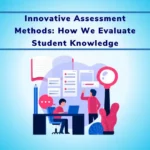
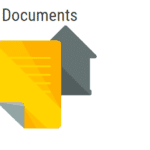

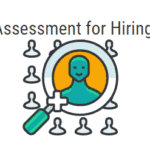









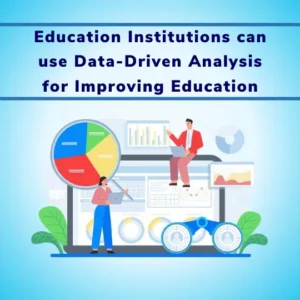
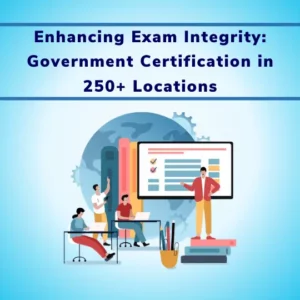
![How Onscreen Marking Revolutionized Central Govt Exams [Case Study]](https://www.eklavvya.com/blog/wp-content/uploads/2024/04/How-Onscreen-Marking-Revolutionized-Central-Govt-Exams-Case-Study-1-300x300.webp)
